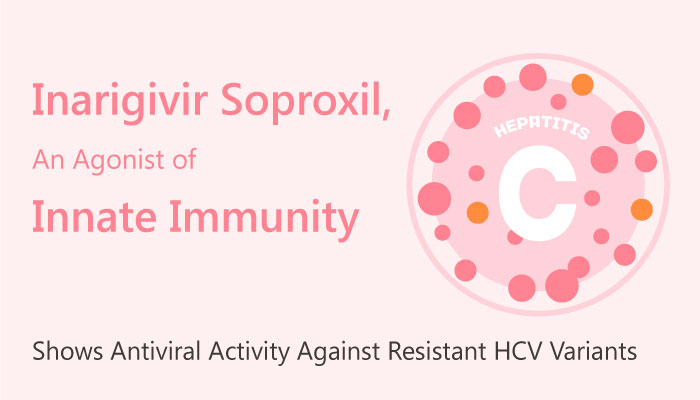Hepatitis C virus (HCV) causes an infectious disease hepatitis C and primarily affects the liver. Patients often have mild or no obvious symptoms during the initial infection time. A fever, abdominal pain, yellow tinged skin, and dark urine occur occasionally. The virus remains latent in the body for many years and often leads to liver disease and occasionally cirrhosis. So far, antiviral medications such as sofosbuvir or simeprevir could cure 95% chronic infection. For scientists, new hepatitis C drugs are highly coveted.

A study from Meleri Jones, et al., described Inarigivir soproxil (SB 9200) as a novel, first-in-class oral modulator of innate immunity. The modulator functions via the activation of the RIG-I and NOD2 pathways. It has broad-spectrum antiviral activity against RNA viruses, such as HCV, respiratory syncytial virus (RSV), norovirus, and influenza. In the study, the authors also demonstrated activity of Inarigivir soproxil against HBV.
Inarigivir soproxil showed potent antiviral activity against resistant HCV variants, with EC50 values of 2.2 and 1.0 μM for HCV 1a/1b in cells of genotype 1 HCV replicon systems.
Notably, the compound presented predominantly synergistic interactions with other HCV drugs in the treatment. Moreover, Inarigivir soproxil showed activity in viral samples from patients who had failed to respond to interferon-based therapy or who had relapsed after DAA therapy. The study also conducted another study in viral samples isolated from known NS5A resistant patients. Surprisingly, Inarigivir soproxil also displayed activity aganist DAA-resistant HCV variants. In addition, Inarigivir soproxil could also effect on pre- and post-relapse HCV variants in a patient with emerging NS5A resistance.
To conclude, Inarigivir soproxil is a promising candidate drug for the treatment of HCV infected patients. The potential compound also has activity in various resistant HCV variants. Fortunately, it has also entered in clinical trials.